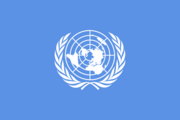 Go to any international think-tank conference and you will hear one complaint repeated ad nauseam: the intenational system, built after World War II – and incorporating the UN, NATO, the IMF, WHO etc. – is no longer fit for purpose. It needs to change to accomodate new threats, like climate change, and new powers like India and Brazil.
Go to any international think-tank conference and you will hear one complaint repeated ad nauseam: the intenational system, built after World War II – and incorporating the UN, NATO, the IMF, WHO etc. – is no longer fit for purpose. It needs to change to accomodate new threats, like climate change, and new powers like India and Brazil.
The last point is particularly oft-heard. If India provides the majority of UN peacekeepers, should Delhi not have a permanent say on the UN Security Council? Now that China has become a pillar of the global economy, should the Beijing government not have more votes on the IMF board?
The limited representation of these states is thrown into relief when compared with the over-representation of European states like Britain and France. As long as this discrepancy holds, the argument goes, states like China and India will bristle at international rules and norms. Given them more power – and us less – and things will be better. Even Dominique Strauss-Kahn, the IMF’s French chief, is said to favour a joint EU seat on international bodies.
Many international organisations may need to evolve. They always have. Today, NATO needs to finds ways to bring civilian, and not just military, assets to its operations. Finding ways to improve international collaboration on homeland security – what’s known as the resilience agenda – will be key. The IAEA needs to be strengthened etc etc.
But these necessary modifications are a far cry from undertaking a root-and-branch reform of the international system. There is simply no evidence for – and a lot of evidence against – the idea that a better setup can be agreed by the world’s powers today. It is a bit like asking whether anyone believes the current US Congress would do a better job of writing the US constitution than the Founding Fathers. Few would say “yes”.
When Kofi Annan sought to reform the UN, very little good came out of it. The Human Rights Commission was replaced by a Human Rights Council. But Libya, China and Sudan still kept their seats.
Yet the idea of total reform is not as starry-eyed as the accompanying notion that granting more power to China and the other BRICS will make them more like us. They won’t. They do not buy into the liberal bias that has infused the international system. Granting them more power will allow these states to champion their own agenda more effectively, not buy into ours. Turning over our seats, say at the UN, to a joint EU seat would, in turn, be a bid for strategic irrelevance.
So, the British government should push modifications of and improvements to the international system. But all politically naïve talk of large-scale reform should be avoided. The West needs to keep hold of the structural advantages in today’s global system, especially at the UN, until they pry our dead, cold hands away.






Comments